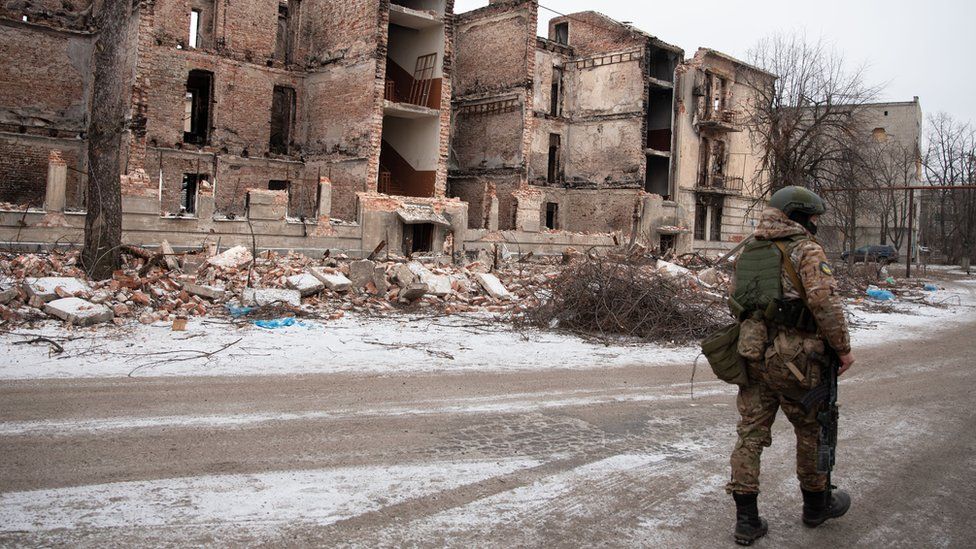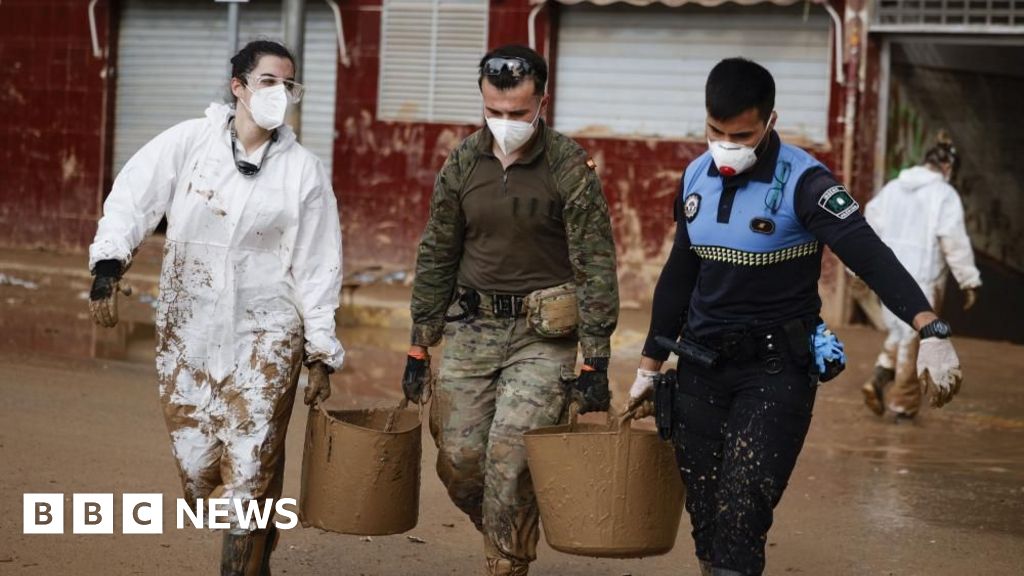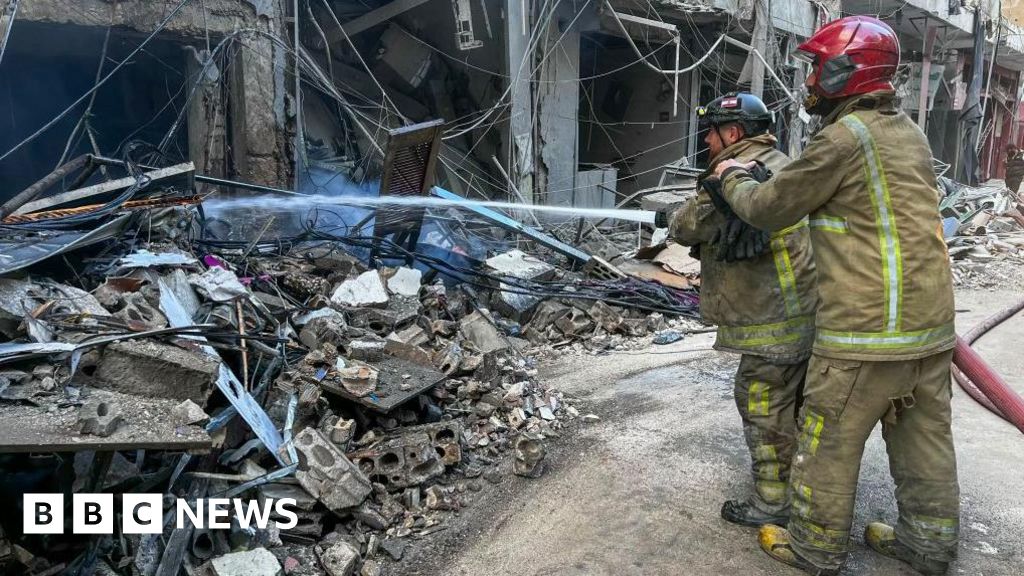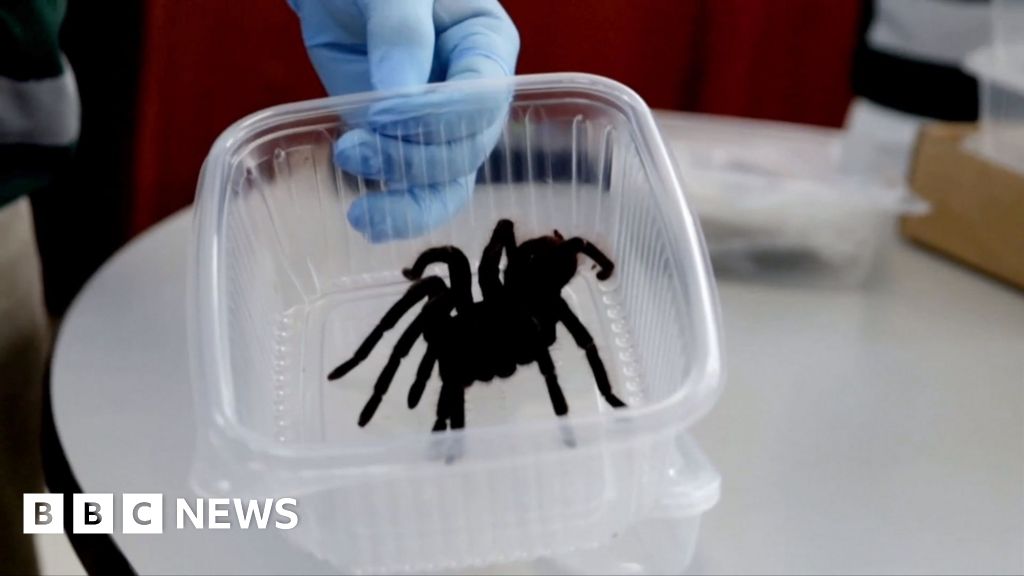ARTICLE AD BOX
 Image source, Getty Images
Image source, Getty Images
Heavy fighting is raging in Ukraine's eastern Donbas region, amid freezing temperatures
By Andrew Harding
Donbas region, Eastern Ukraine
Ukrainian troops on the front lines in the Donbas have told the BBC that Russian forces are "learning every day and changing their strategy," as they continue to gain ground around the heavily contested town of Bakhmut. But the soldiers also insisted that morale remains high, despite growing exhaustion after almost a year of war.
The two Ukrainian soldiers swept into the room, still visibly flushed with adrenalin, having just driven straight from the furiously active front lines along the rolling, snow-covered hills further south. Peering over a giant map at their brigade's temporary headquarters, they jabbed at the spots where Russian forces are inching forwards towards a key road.
"They were about 400 metres from us, across the field just here. We're holding on, but it's getting harder," said Sgt Denys Kalchuk from the all-volunteer Dnipro-1 Battalion, going on to describe how Russian infantry, fighter jets, and artillery units appear to be operating with growing coordination and effectiveness around Bakhmut.
"The planes are the worst. You can't hear them until it's too late. It's the same with the tanks. Artillery is easier - at least you might have a second or two [to dive for cover] after you hear them coming," said Sgt Kalchuk.
Assessing the overall state of the conflict across the Donbas is extremely difficult. Access is challenging and dangerous, and dozens of different Ukrainian battalions and brigades are working on separate tasks, amid some secrecy, spread out along hundreds of miles of often fast-changing front lines.
Image source, Getty Images
Image caption,Ukrainian troops say Russian forces are operating with growing coordination and effectiveness around Bakhmut
But after several weeks travelling across the region, and more than a dozen on-the-record interviews and frank off-the-record discussions with a broad range of Ukrainian soldiers, I've seen various themes emerging.
For weeks, Russia's notorious mercenary group, Wagner, has led much of the fighting around Bakhmut, sustaining catastrophic numbers of casualties by launching near-suicidal mass infantry attacks on smaller towns like Soledar. But in recent days, according to some Ukrainian soldiers, Russia's regular army has resumed a more prominent role, with noticeable effect.
"It is very hard for us now. We understand that Russia is learning every day and changing their strategy. And I think we need to learn faster," said Dmytro Podvorchanskyi, who heads a reconnaissance unit in Dnipro-1.
He and others spoke of the way well-equipped regular Russian forces are now hiding and dispersing their ammunition stores far better and are targeting Ukrainian logistics routes more effectively. As a result, they are continuing to gain ground around Bakhmut and threatening another potentially significant town, Vuhledar, further south.
Dmytro Podvorchanskyi says Ukrainian troops need to learn faster
But there is no indication, as yet, that Russian forces are poised to make a strategically significant breakthrough. One senior commander said western supplies had now brought a balance to what had been a deeply uneven artillery war, and that western tanks could soon tip the overall balance in Ukraine's favour.
While it is no surprise that many Ukrainian troops are suffering from exhaustion after months of conflict, morale, in general, appears to be holding.
"There have been cases of (Ukrainian) units who don't seem willing to fight, and disagreements (over tactics)," one Ukrainian soldier acknowledged, speaking off-the-record.
Others talked about the trauma of seeing their friends die, of units that have sustained overwhelming numbers of casualties and of the psychological impact of fighting amidst the corpses of so many uncollected Russian soldiers. One soldier, citing fears of a new Russian mobilisation and the huge size of the enemy's population, spoke of his fear that "Russia will grind us down." But most troops we met waved away such doubts, blaming them on exhaustion, and - in general - praising their commanders for giving them time to rest.
Image source, Reuters
Image caption,Russia has devastated the Donbas region with bombing and shelling
One increasingly common excuse offered for Ukraine's struggles around Bakhmut is the theory that relatively weak and inexperienced units are now being left to hold the line here, while the army's strongest forces are being moved elsewhere ahead of a widely anticipated Ukrainian counterattack, or counterattacks.
The location of any such potential offensives remains the subject of much speculation among Ukrainian troops. Some anticipate a push further north, into Luhansk province, while others wonder about an attack south towards Melitopol, in order to isolate and threaten Russian forces in and around the Crimean peninsula.
One experienced officer said he believed Russia was looking to straighten its frontline, take a few more chunks of the Donbas, and then declare "mission accomplished" and push for peace negotiations. He said he was sure Ukraine would never agree to that but warned that the military would need western fighter jets to break through all of Russia's new defences, particularly in the south of the country.

 1 year ago
23
1 year ago
23








 English (US)
English (US)